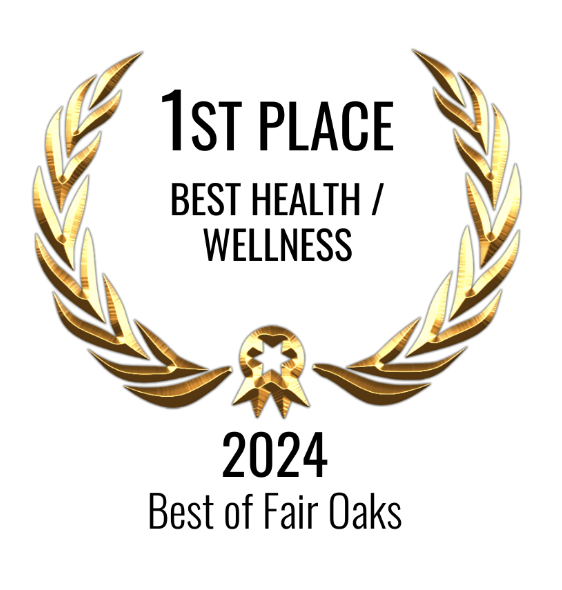
TEEN COUNSELING ONLINE & IN SACRAMENTO
If you landed here, it’s a safe bet that your teen is struggling and you’re looking for help.
This speaks to how much you love your child and would do just about anything to ensure that they’re happy, healthy, and safe.
Maybe they were the happy-go-lucky kid growing up—always full of life and energy—but now they’re down and out more than they’re not. This “phase” doesn’t feel like a normal teenage slump—it feels like something else.
We’re honored to be voted…
2024 Winner Best of Fair Oaks!
Does your teen seem disconnected or withdrawn?
Or maybe they're less confident, and more scared and anxious.
Maybe you're afraid they're using drugs and alcohol, or they’ve been caught.
You know something is "off" with your teen, but you aren't sure what.
Maybe you’ve seen a drop in their grades or other problems are starting to surface.
They seem apathetic, unmotivated, and generally just not themselves.
Things have changed with your teen and you're starting to worry.
You used to be close, but lately there’s been a lot of distance. You try to get them to open up, but they shut down or get angry. You’re not sure how to talk to them anymore—every conversation feels like a strikeout.
You know some of this independence is normal, but your “gut” is telling you that something is out-of-balance. You've seen a big change in your teen and can tell they’re really going through it. But again, they won't talk about it, and you're at a loss as to how to help.
Maybe this isn't the first time you've thought about getting therapy for your teen.
How the teenage brain can get in the way.
Why does this happen? The part of your teen’s brain that helps them think things through—called the prefrontal cortex—is still developing, and so they are primarily reacting from the emotional part—the amygdala.
The bad news is, according to research, this rational part of their brains won’t be fully realized until they reach the age of 25 years or so, as everyone develops at different rates.
Probably everything you’ve heard about the teenage brain is somewhere close to true. While it can be an exciting time in your teen’s life—a formative time to figure out who they are—it can also be quite challenging. Most often, they are operating from their emotions, which they feel intensely—a reality that can sometimes make things difficult to say the least.
The good news is that through some intentional guidance, they can learn to interact with their emotions in healthier and more productive ways.
Teens today face more challenges than ever.
Most would agree that teens today face an untold amount of pressure. While some pressure is good, today's teens feel it from almost every angle—there’s pressure to fit in, get good grades, navigate friendships and relationships, find purpose, save the world, get into the “right” school, and so on.
All of this, of course, is amplified by the dominating presence of social media, bombarding them with lots of competing messages—some good and some that you hope won’t stick.
You want them to listen to the “right” messages—the ones that move them in healthy directions—and to have the tools to unhook when they've gotten snagged by the bad ones.
This is where effective teen counseling, from a licensed teen therapist can really help.
Professional Teen Counseling in Sacramento and online in California.
Our therapists have several years of experience working with teens and families—of all different kinds—to help them get reconnected.
We focus on helping your teen find balance, develop a strong sense of self, clarify and live by their values, and create space so that they can make decisions that move them toward health and wholeness, and away from unhealthy behaviors.
We do this by meeting your teen wherever they're at—we not only want to help them develop insight but give them practical, usable tools and strategies that work in their everyday lives.
How teen counseling can help:
We’ll help them get reconnected by focusing on four main areas —
A strong therapeutic relationship where your teen feels safe to be themselves.
Mindfulness skills to help them get more connected and deal with stress more effectively.
Emotion regulation tools to help them handle difficult emotions, which can get in the way of good decision-making.
Communication skills to help them express their needs and to be able to set healthy boundaries when they need to.
The long-term benefits of teen counseling.
We understand that when your child is struggling, you're struggling—and we know it can be really tough and scary.
Counseling can give your teen the chance to build their emotional intelligence now—to really learn how to tune in and evaluate what their emotions are trying to tell them and how their actions affect others. Therapy is an investment into their future.
A recent study, published by the Society for Research in Child Development, found that early interventions aimed at developing emotional intelligence had positive lasting effects which persisted across the lifetime (SRCD, 2017).
According to researchers at Yale University, people who have high degrees of emotional intelligence fare better in life. They have healthier relationships, more successful and rewarding careers, and are generally happier and more content (Social and Personality Psychology Compass, 2011).
Teen counseling is effective at helping adolescents deal with lots of struggles, including substance use, depression, anxiety, relationship issues, identity issues, low self-esteem, and much, much more.
Many parents tell us that they want to help their teen, but just don't know how. If your teen is struggling and you’re feeling stuck, let us help. We’ve helped many families and teens just like yours get reconnected.
If any of this sounds like your teen, counseling can help them get reconnected again. Reach out to Whole Wellness Therapy today to get started.
Consider working with our LGBTQ teen therapists.
We help teens who may be struggling with their sexual identity or experiencing social, emotional and communication challenges related to their LGBTQ identity.
Are you concerned that they are not coping well or making risky choices to deal with their emotions?
Therapy can be effective for LGBTQ teens who are struggling to handle these issues, and a Whole Wellness Therapy therapist can help your teen work through them.
By providing a supportive and accepting environment, your therapist can help your teen navigate difficult social situations, understand and accept their identity and choices, and make healthy choices that can improve their self-esteem and relationships.
Therapy can also provide support and guidance for parents on how to communicate more effectively with their teen about LGBTQ issues. While cost may be a concern, investing in your teen's emotional health can prevent future problems and promote healthy relationships at home. At WWT, we match your teen with a therapist who is trained and experienced to work with LGBTQ teens and whose personality is a good match for your child's. If your teen is guarded about their sexual identity, our therapists provide a safe and non-judgmental environment for them to express themselves.
Get started today with therapy for teens in Sacramento or online in California.
Led by the right therapist, teen counseling can help your child thrive in the present and future. Reach out to us to get started with teen counseling today.
Whole Wellness Therapy offers teen counseling online and at all of our Sacramento counseling office locations.
Meet the Team
-

Jillian Cardoso, LMFT
I work to create a trusting relationship with each of my teen clients and utilize a person-centered approach that ensures a unique and personalized treatment plan. I will often integrate a cognitive behavioral or solution-focused intervention to assist you in understanding yourself and others around you to the best of your ability.
-

Paul Singh, MA, AMFT
I also come from a place of LGBTQ+ affirming belief. I understand that there are many aspects of our identities, and I believe that those identities should be wholly accepted, allowing you to bring up anything and everything you need to within the therapeutic space. There is no shame in who you are or what you are bringing into therapy. We are all human, so come to therapy bringing your whole self.
-

Jamie Johnson, MS, LPCC
Each teen is unique and there isn’t a “one- size fits all” approach to therapy. I strive to meet each person where they are at in life, and will utilize the strengths you already possess to tailor an approach that fits your specific needs and goals. I place a great deal of value on the therapeutic relationship, as my own journey has taught me the importance of having a safe, non-judgmental space to examine one’s concerns, work to find solutions, and build more meaningful relationships with one’s self and others.
-

Jacob Simon, MPA, MA, AMFT
As a therapist, I try to be as flexible as I can, because everyone needs something different. Generally, I find that I work well with teens who enjoy a warm and kind presence, as well as those who are curious about themselves. If you are dealing with trauma, which many teens are, I want to support you and hold space for your experience.
-

Michelle Mohammadian, LMFT
My goal is to work collaboratively with my clients in order to bring light to their authentic and best self. I am committed to providing a safe, supportive, and non-judgmental environment to help clients towards their personal goals of emotional wellness.
-
Samantha Skiles, AMFT
In our work together, you are driving the car, you determine the destination, and together we find the path that works best for you to get there (with room for detours and re-routing). I am passionate about helping teens find empowerment through the cultivation of mindful self-compassion, healthier relationships, and a more integrated sense of self that will guide and ground them while navigating through life.

“My therapist is extremely caring and completely present in session. She intuitively knows where I may be having difficulties and provides exercises and tools that help me understand how to move a little closer to a healthier, happier, guilt-free outlook. I was lost when I started. I now feel I have a much better understanding of my struggles and practical tools to help me daily. So thankful my physician recommended.”
— Cathy N.












